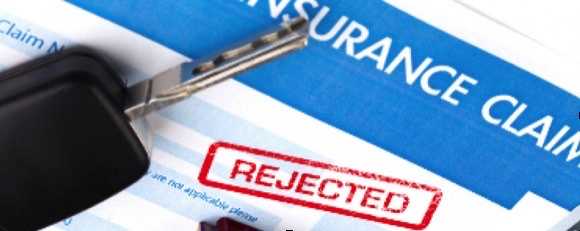Six reasons why the insurer denies car insurance claims
Car insurance does more than protect you from the wrath of the law; it provides financial protection to both you and the third party. But, unfortunately, it is pretty easy to undermine the importance of getting insurance cover, especially where we convince ourselves that we can be overly careful and avoid accidents.
The truth is that car owners cannot predict accidents. They occur unintended, and the best way to protect oneself from damages that arise from car accidents is by taking an insurance cover.
Getting an insurance cover means that you are required to pay a premium to the insurer, who guarantees to cover you in the eventuality of an accident.

The insurer is required to repay you in the eventuality that whatever risk you have insured against happens. When such a risk occurs, you have a claim from the insurer. The insurance claim comes as a legal right to you. Although the insurer will typically grant such a claim, there are situations where the insurer may deny an insurance claim.
Here are six reasons why the insurer denies car insurance claims.
- Where your vehicle is modified
Most car insurers are reluctant to insure cars that are modified. In Singapore, car modification is of three types, namely:
- Modifications that do not need approval Land Transport Authority (LTA)
- Improvements that require approval from LTA
- And alterations that are not allowed by law.
Depending on the insurer you are using, Singapore insurers may still refuse your claim to your modified vehicle, even if such a modification has approval from LTA. Some insurers may restrict claims to the original cost of replacement without modification. It is essential to find out what is acceptable to your insurer.
While others require that the insured disclose every modification made to the vehicle, failure to make such disclosure will cause the insurer to deny a claim to an insurance contract.
2. Failure to report an accident
Failure to report an accident may cause the insurer to deny the insured claim. One may ask, why should the insured not report an accident. The insured may protect the no-claim discount (NCD) and may choose a private settlement instead.

Most Singapore insurers have inserted a clause to deny liability on failure to report an accident within 24hrs of its occurrence or the next working day after the accident. In the event of private settlements, reporting the accident does not affect the NCD. Failure to comply with the disclosure policy will be seen as a breach, and therefore the insurance company is not liable. It will also result in the loss of a no-claim discount.
There are situations the insured cannot report the accident within 24 hours of the accident due to circumstances beyond his/ her control. The insured must, however, report the accident as soon as possible.
3. Fronting
Fronting is relatively common. It occurs where the insured uses another individual driving profile instead of the insured identity. An instance is when a parent adds their child to their car insurance cover even when they are mostly driven by the child. While this saves money, the car insurance company will deny liability when discovered that any critical information has been altered or withheld by the insured. It is essential to know that the consequence of fronting could mean that no other insurance company will be willing to provide a cover for the person. Thereby leaving him without an insurance cover. It could also invalidate the current policy, thereby affording the insurer a reason to deny the claim. Some insurance companies may also blacklist you, which means you could find it nearly impossible to get a cover in the future.
4. Non-adherence to claim process
Every insurance company has a claim process that must be followed by the insured. You may be required to inform the insurer of the accident within a time frame, or you may be required to submit important documents. Failure to follow the claim process may mean that the insurer could deny the claim.

In the case of an accident with a third party, the insured should report the accident within 24 hours of the accident. You should also take pictures of the accident scene. You may be required to get the contact of the third party involved in the accident. Follow all procedures relayed to you by your insurer where the need for a claim arises.
5. Claims arising out of exclusion
Most car insurance policy comes with an exclusion clause that specifies the situations which the policy do not cover. Claims arising from the exclusions are denied by the insurer. Such exclusion may include a refuser of the insurer to cover illegal usage of the car, wear and tear of the vehicles, and drive outside the insurer’s geographical limits. Making a claim out of this exclusion, your insurer has the right to deny your claim.
6. Where the insured is involved in another accident
It is the most popular reason why an insurer may deny the liability of an insured claim or turn down the application to be insured. Casualties are unintended and unplanned, but the insurer may deny the insurance claim if the driver failed to declare his accident history correctly in the past 3 years.
Their reason is to prevent the abuse of insurance claims by the insured. For example, an insured who has been involved in an accident previously could raise a red flag that such a driver has little or no experience or is negligent in carrying out his duty of due care.
Insufficient documentation
Where there is insufficient documentation provided by the insured on the details of the accident. The lack of evidence makes it hard for the insurance company to evaluate the situation clearly.
Therefore, the insurance company reserves the right to decide if the claim will be processed.
Therefore, it is essential that the insured deal in good faith with the insurance company and provide all the required documents.
Other issues
Other issues which could lead to the insurer denying a car insurance claim include
● Insurance coverage
Your insurance cover may be limited to a specific amount of coverage, usually stated in the contract. For instance, the insurance company’s total damages may be liable to may be limited to 25,000 Singapore dollars. It may also mean that the insurance cover third-party damage alone.
● Default in insurance premium
The insurance premium is the required amount requested by the insurer for taking up the risk covered in the contract. The insurance company holds the right to deny any claim if the insured had failed to pay the required premium at any time. In situations where the
insured could not bear the insurance premium once in the contract, such failure is considered a breach of the insurance contract.
Conclusion

The insurance company may deny liability if any of the above occurs. The insurer assumes that the insured deals in good faith and that all information provided by the insured is accurate and fair. Also, there is the assumption by the insurer that the vehicle is not modified, even if slightly.
Where any of the elements listed above occurs, the insurer may consider it a breach of contract and deny liability.
Read more on
Have you checked us out on Instagram.
Check us out here.Related Stories
Advertisement Advertisement
Advertisement Advertisement
Advertisement

